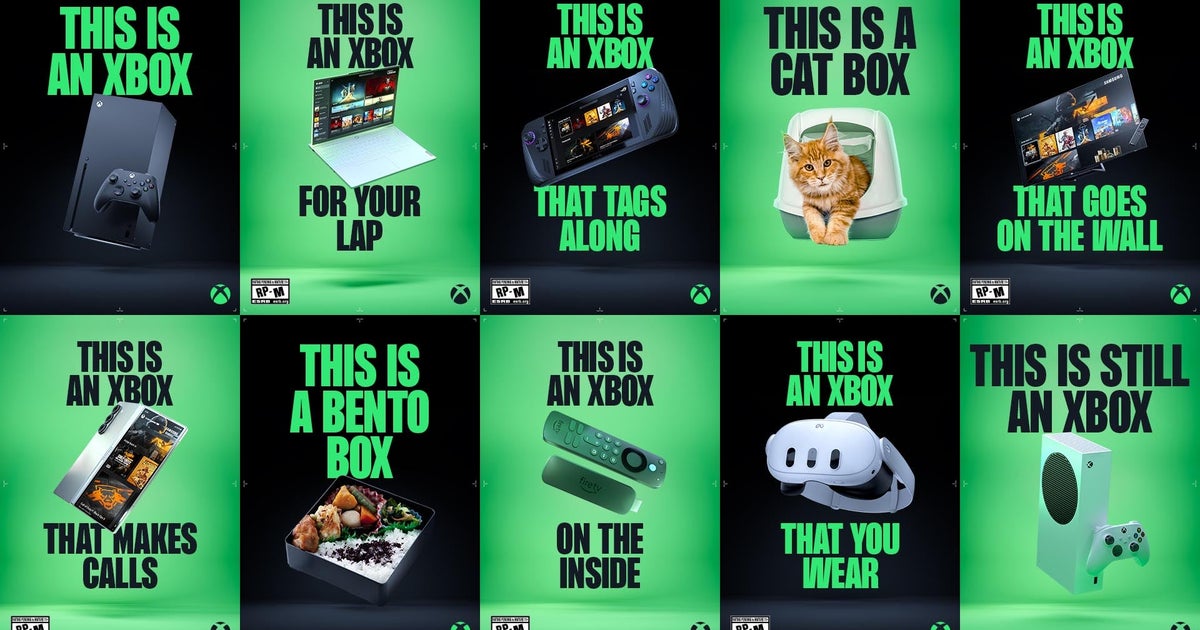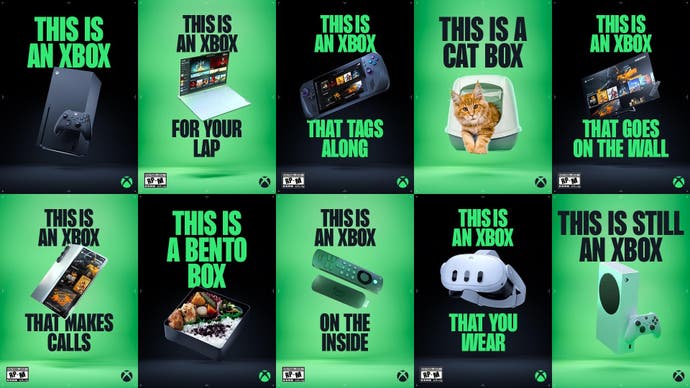
DF Weekly: What is an Xbox? Not an existential crisis but the latest phase of Microsoft’s big transition

What is an Xbox? It’s a pretty straightforward question, right? I’d define it as a custom piece of gaming technology, generally box-shaped, that typically sits in the lounge or bedroom. Competitively priced, it’s a mainstream-orientated product that offers a great balance between price and performance and is as close to plug and play gaming as you’re going to get. It is a console, or is it? Microsoft begs to differ with its latest, remarkable messaging. A cloud client running on a smart TV, Amazon Fire Stick or Meta Quest VR headset is now an Xbox. A desktop PC is an Xbox. A laptop or PC handheld is also an Xbox. It’s all part of Microsoft’s transition plan to evolve Xbox from a console/PC ecosystem into an ‘Everywhere’ platform that’s as device-agnostic as it’s possible to be – but is it going to work?
Looking at the market from a meta perspective, it’s got to work. Xbox needs to reach out beyond the existing pool of console gamers. The basic economics are simple. Market data suggests that the amount of console users in total is not shifting from one generation to the next. Not only that, some data is suggesting that it is the same people buying those consoles from one generation to the next. In the meantime, the cost of making games is getting ever more expensive. The only sustainable route forward is to reach beyond circa 200m to 250m console gamers and find a larger audience. Microsoft began that work years ago in ending game exclusivity by releasing key titles day and date on PC – but the strategy now looks to be a case of releasing those games on any piece of hardware capable of running them.
By virtue of its various acquisitions, Microsoft/Xbox has effectively become a multi-platform publisher that cannot and should not ignore rival console systems like Nintendo Switch, the Switch successor and PlayStation 5. When the Activision Blizzard King acquisition was announced so long ago, we were still in the midst of console wars and the expectation may have been that Call of Duty would go Xbox exclusive – but the finances would not have worked, the regulatory pressure on the acquisition was too over-bearing and ultimately, Microsoft would likely have lost money by freezing out the PlayStation audience. I can only assume that the calculation was made that PlayStation users would not leave their libraries behind and ‘defect’ to Xbox – and why should they?
- 0:00:39 Introduction
- 0:02:56 News 1: Phil Spencer: no “red lines” on Xbox ports
- 0:27:21 News 2: Lego Horizon Adventures impresses on consoles
- 0:36:40 News 3: Halo 2 E3 demo resurfaces in Master Chief Collection
- 0:51:30 News 4: PS5 Pro sales reportedly not impacted by price
- 1:01:35 News 5: Stellar Blade developer considering PC release
- 1:08:35 News 6: Intel plans Arrow Lake performance fix
- 1:17:47 News 7: ModRetro Chromatic impresses
- 1:28:37 Supporter Q1: How will the next Xbox achieve the “largest technical leap” in a console generation?
- 1:35:46 Supporter Q2: If the next Xbox doesn’t have a disc drive, how will disc backwards compatibility function?
- 1:42:15 Supporter Q3: Are you excited to see the rumoured Nvidia ARM-based laptop chip?
- 1:48:22 Supporter Q4: Will we see support for ultrawide aspect ratios on consoles?
- 1:56:56 Supporter Q5: Can we give Epic credit for allowing Internet Archive to host older Unreal games?
Meanwhile, for various reasons, Xbox hardware sales have slowed down significantly – a combination of old Xbox One users on ‘forever games’ finding no reason to upgrade, along with a consistent lack of delivery of top-tier titles that may make users jump over to the Xbox brand. In acquiring a greater split of the existing, static market, it has failed. Therefore, a new strategy was required.
Part of that strategy rests on the concept that Xbox can no longer be just a console and a PC app – and so we find ourselves confronted with the ‘this is an Xbox’ campaign. To Xbox diehards, this looks like a marginalisation of the console as the home of the platform. To others who know exactly what an Xbox is and has been since 2001, it may look desperate or even laughable. Part of the problem is that Microsoft is effectively marketing against 23 years of its own messaging – and that’s a tough place to start from. The thing is, the marketing is not really aimed at the core audience. Microsoft has wider horizons.
The truth is, the nature of the market is changing. The console audience may not be growing, but people are still enjoying games in record numbers. PC continues to be highly popular and gaming laptops in particular are shifting serious numbers. The laptop version of the RTX 3060 sits at number 11 in the graphics sub-section of the Steam Hardware Survey, while remarkably, the RTX 4060 laptop model is number two, ahead of its desktop equivalent (in fairness, it launched earlier, but even so, it’s a remarkable state of affairs). Meanwhile, there’s plenty of excitement around PC handhelds, where Microsoft is clearly seeing some kind of opportunity. Steam Deck has revealed latent potential here and some might say that Xbox has to move in this direction before Valve expands, dominating all areas of the PC market, up to and including the console space. An Xbox handheld is coming, but I would expect Windows improvements to make existing handhelds more Xbox-like in the meantime.
“This is an Xbox” looks to be aimed at a wider and possibly younger audience, who don’t seem particularly invested in the console concept – but there is risk in this strategy. The danger is that everything Microsoft has achieved with Xbox-as-a-console becomes sidelined, which is the key concern of prominent Xbox influencers, who fear a dilution of the brand and the community. The console is the focus and without it, Xbox becomes something quite different – a publisher, not a platform holder. At worst, Xbox becomes a client or a launcher, not that much different from EA or Ubisoft, just operating at a much larger scale.
That may be somewhat alarmist as Microsoft is committed to new hardware. In an interview with Bloomberg last week, Phil Spencer discussed a new handheld in development that’s likely years away from release. Sarah Bond has talked about a Gen 10 console delivering the “largest technical leap you will have ever seen in a hardware generation”. And at the same time, there are also heavy hints about being able to run other storefronts on Xbox hardware – heralding some kind of merging between PC and console functioanlity. Expect machine learning to be doing a lot of heavy lifting in validating Sarah Bond’s claims, especially as Spencer is ruling out $1000 consoles. I think Microsoft needs showcase hardware but the importance of PC going forward cannot be understated: we’ve been saying for some time now that Xbox and Windows should merge, effectively making every PC in every category an ‘Xbox’ of some description.
And from there, the overall importance of the console starts to diminish. While a plug and play box remains, the market itself can take over with its own PC-based Xbox hardware and core users can literally build their own Xbox hardware. In parallel, Microsoft will continue to double down on cloud gaming, where Phil Spencer says there’s already significant growth.

Meanwhile, his comments on there being “no red lines” on which games go to other consoles should be taken seriously and literally. The ultimate hedge against the uncertain future for the console is simply to saturate all areas of the market with great games and reap the benefits – a much surer bet than building a business model around a box you lose money on with every sale. If a piece of hardware can run Call of Duty or – dare I say it – Halo or Gears, Microsoft and Xbox can only benefit by releasing those games there. All I’d say on this front is that unambiguous Game Pass launches for those titles has to be a given and if the pace of the multi-platform roll-out continues as is, I honestly think we need to see new Xbox hardware sooner rather than later. For another generation at least, the plug and play console has a big role to play.
But this is a transitionary period and the pace of change has been quite astonishing. As John says in this week’s Direct, if we go back just 12 months to November 2023, the idea of Microsoft embracing PlayStation development had no real credibility whatsoever. And yet just a couple of months later, Phil Spencer, Sarah Bond and Matt Booty officially kicked off this transition in the Xbox business. Four games were mooted for PlayStation release, as an experiment – which always did seem like tuned messaging as opposed to a reveal of the full strategy.
We’re now at the point where key Microsoft Studios titles like Diablo 4 and Call of Duty Black Ops 6 aren’t just on PlayStation 5, they’re enhanced for PS5 Pro. Indiana Jones on PlayStation? Yes, there’s a relatively short delay, but I’d expect that to be another key waypoint in the transition to full, day and date multi-platform support. If every screen is to be an Xbox, that should include those attached to PlayStation consoles too – or the overall thrust of the marketing doesn’t fully make sense.
That’s my take on Microsoft’s journey this year: moving away from the concept of exclusive games and consoles, instead concentrating on increasing revenue, growing the size of the business and – as Phil Spencer says – turning the Xbox experience on PC from “good” to “great”, a massively important investment for the future. On that latter point, I feel there’s a huge amount of work to do. Whatever Microsoft is planning with Xbox and Windows, an upgraded app would be the bare minimum. We should be looking at the migration of the entire, streamlined Xbox interface to Windows, taking care of driver updates and system software upgrades for the user and comprehensively addressing the PC platform’s failings, perhaps with a revamped DirectX.
It sounds challenging but it can be done. Remarkably, despite not running games natively, Linux is now becoming a genuine challenger to Windows for gaming: SteamOS and offshoot Bazzite retain PC-like features but provide a console-like experience that works, even managing to mitigate shader compilation stutter in a way that DirectX has yet to match. Steam Deck works as a platform and demonstrates that Linux could power an Xbox alternative in the console space, while posing challenges to Windows on desktop PCs.
For all the commentary and speculation in this piece, I’m sure there are still pieces of the puzzle missing. Since January, the multi-platform strategy has evolved to where we are now and hints on hardware have been shared, but right now, anything beyond that is basically guesswork. There does seem to be a general direction of travel here, a gradual/phased reveal for the platform holder’s plans for the console and PC space – and I’m genuinely fascinated to see what happens next, and just how and when the “largest technical leap you will have ever seen in a hardware generation” is revealed.






